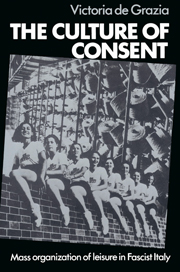Book contents
- Frontmatter
- Contents
- Preface
- 1 The organization of consent
- 2 The politics of after-work
- 3 Taylorizing worker leisure
- 4 The penetration of the countryside
- 5 Privileging the clerks
- 6 The nationalization of the public
- 7 The formation of fascist low culture
- 8 The limits of consent
- Abbreviations
- Notes
- Bibliography
- Index
6 - The nationalization of the public
Published online by Cambridge University Press: 18 December 2009
- Frontmatter
- Contents
- Preface
- 1 The organization of consent
- 2 The politics of after-work
- 3 Taylorizing worker leisure
- 4 The penetration of the countryside
- 5 Privileging the clerks
- 6 The nationalization of the public
- 7 The formation of fascist low culture
- 8 The limits of consent
- Abbreviations
- Notes
- Bibliography
- Index
Summary
The formation of an overriding national identity, as the fascists well understood, depended at least as much on the relations of classes with each other, as on the relations of the mass of citizens to the central state. The establishment of a national agency like the OND even contained a certain risk: that it might become a further source of social division by revealing the very uneven levels of consumption, diverse associational and cultural traditions, and inequality of privileges among its numerous special constituencies. In its rhetoric and many of its programs, the OND was thus especially concerned to emphasize its role as the organizer of a unified public – a new national base for the regime and a counter to the regionalistic and class-based associationalism of the past. Although OND directives were, as we have seen, highly specific in their sectoral and local application, they were linked by common policies toward the formation of a seemingly egalitarian though definitively “low-brow” national cultural identity.
The most far-reaching of these were concerned with the attempt to manipulate those tendencies, endemic to capitalist development, that would potentially cut across class and regional lines; such were the expansion of a mass consumer market and the growth of the mass media. Fascist organizers were able to capitalize on the fact that the development of a mass consumer market in interwar Italy demanded regulation to compensate for the highly unequal levels of consumption.
- Type
- Chapter
- Information
- The Culture of ConsentMass Organisation of Leisure in Fascist Italy, pp. 151 - 186Publisher: Cambridge University PressPrint publication year: 1981



